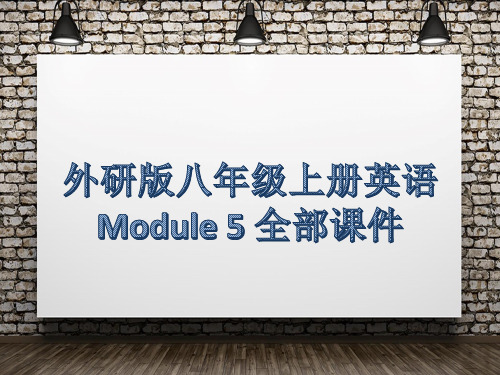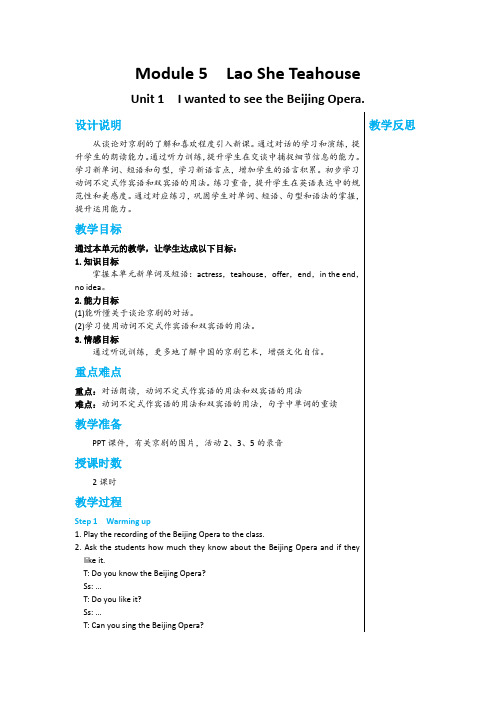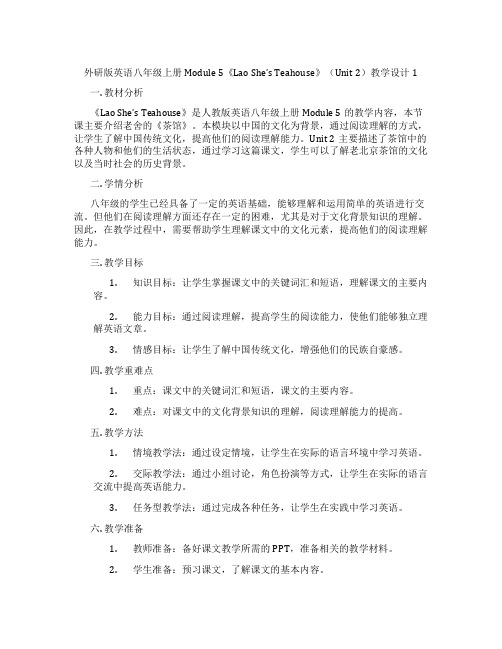八年级上外研版英语Module 5
外研版英语八年级上册Module 5 全部课件

audience
Lao She Teahouse
Have you ever been to Lao She Teahouse? What can people do in Lao She Teahouse?
Lao She’s Teahouse nowadays
Inside of Lao She Teahouse
Lingling (1) _o_ff_e_r_e_d_ to take Betty to Lao She Teahouse. The words of the opera were (2) _d_if_f_ic_u_l_t to understand, but the actors
and (3) _a_c_t_r_e_ss_e_swere excellent. They only planned to watch for an hour, but in the (4)__e_n_d___, they stayed for three hours.
Module 5 Lao She Teahouse
Unit 1 I wanted to see the Beijing Opera.
老舍(1899年2月3日—196N 6年o8月24 日),男W,ho原is名he舒?庆春,Im 字舍a予g,e另有 笔名絜青W、ha鸿t d来o y、ou非k我no等w。ab因ou为t h老im舍?生 于阴历立春,父母为他取名“庆春”, 大概含L有ao庆S贺he春(18来99、-19前66景) w美as好on之e o意f t。he上 学后,m自o己st r更en名ow为ne舒d (舍著名予的,)含有“舍弃 自我”c,on亦tem即p“ora忘ry我(当”代的的意) C思hi。ne北se 京满 族正红w旗ri人ter。s, f[a1m] ou中s f国or现his代no小ve说ls 家and、作
外研版八年级上册Module 5知识点整理

外研版八年级上册Module 5知识点整理一.重点短语1.in the end最后,终于2.be famous for因……而出名”3.would like想要4.the beginning of……的开头5.send sb. to sp.把某人送到某地6.be named被命名为……7.give a warm welcome to热情欢迎……8.take place发生9. no idea 不知道二.用法集萃1.want to do sth.想要做某事2.offer to do sth.主动提出做某事3.plan to do sth.计划/打算做某事4.hope to do sth.希望做某事5.Let’s do sth.让我们做某事吧。
6.Why don't we do sth?我们为什么不做某事呢?7.make sb./sth.+adj.使某人/某物处于……状态8.It is +adj. +to do sth.做某事是……的.三.重点句型1.Lingling offered to take me there.玲玲提议带我去那儿.2.He’s especially famous for his play Teahouse.他尤其以他的话剧«茶馆»而著名。
3.Teahouse is one of Lao She’s most famous plays.«茶馆»是老舍最著名的话剧之一。
o She Teahouse gives a warm welcome to everyone from all over the world.老舍茶馆热情欢迎来自世界各地的人们.四.语法归纳:(一)动词不定式作宾语(二)双宾语教材中含有动词不定式的句子:1.You know, I wanted to see the Beijing Opera.你知道,我想看京剧。
2.Lingling offered to take me there.玲玲提议带我去那儿。
外研版英语八年级上册Module 5单元知识点归纳总结(详细版)

Module 5一.重点短语:1.主要的事情2.不知道3.主动提出做---- 给某人提供、提议什么4.带某人去-----5.最后6.下次7.因---以---对谁--而出名8.在中国社会9. 平民老百姓的生活10.从19世纪末到二十世纪中期11.把某人送到某地12.毕业后13. 回到中国14.被称为---15.在老舍茶馆16.热情欢迎---17.发生18.中国最伟大的作家之一19.二十世纪前半期20.思考社会21.一个很好的选择22.对---正合适,适合于---23.把---演的活灵活现,演的逼真24.表现的相当出色,做的很棒25.茶馆的主人26.同时27.现代中国28.对人们的生活了解了许多29.大约公元前600年1.the main thing2.have no idea3.offer to do sth offer sb sth =offer sth to sb4.take sb to some place5.at last/in the end6.next time7.be famous for ---as ---to sb8.in Chinese society 9.the lives of common people10.from the end of the nineteenth century to the middle of the twentieth century11.send sb to ---12.after finishing school13.return to China =come /go back to China14.be named ---15.at Lao She Teahouse 16.give a welcome to sb 17.take place18.one of China’s greatest writers 19.the first half of the twentieth century20.think about society 21.a very good choice22.be right for ---23.bring----to life 24.do a very good job25.the owner of the teahouse 26.at the same time27.modern china 28.learn a lot about people’s lives29.around 600BC三重点句型1.我想看京剧所以玲玲主动提出带我去那里2.京剧的戏词很难懂,但男演员和女演员很棒。
外研版八年级英语上册Module 5单元知识点归纳

外研版八年级英语上册Module 5 Lao She TeahouseI wanted to see the Beijing Opera.必背单词1.actress(n.)女演员→actor(n.)男演员2.offer(v.)提议,提出→offer to do sth. 主动提出干某事3.teahouse(n.)茶馆4.end(n.)(时间的)最后一段,末尾;(v.)结束必背短语5.no idea 不知道6.drink tea 喝茶必背句子7.Lingling offered to take me there.玲玲主动提出带我去那儿。
8.It was difficult to understand the words.台词很难理解。
9.We only planned to watch for an hour,but in the end,we stayed for three hours.我们原计划只看一个小时,但最后我们呆了三个小时。
10.I hope to understand more next time.下次我希望能听懂更多。
11.He's especially famous for his play Teahouse.他尤其因为他的话剧《茶馆》而出名。
It describes the changes in Chinese society.必背单词1.show(v.)展示;显示→showed(过去式)2.twentieth(num.)第二十→twenty(基数词)二十3.describe(v.)描写;描述→description(n.)描述4.society(n.)社会→societies(pl.)5.act n.(戏剧、歌剧或芭蕾舞的)一幕6.common(adj.)普遍的;一般的7.college(n.)大学;学院8.novel(n.)(长篇)小说9.name(v.)给……取名;给……命名10.if(conj.)如果;若11.magic(adj.)魔术的;戏法的必背短语12.head teacher 校长13.the end of the nineteenth century十九世纪末14.be born 出生15.all over the world全世界必背句子16.Teahouse is one of Lao She's most famous plays.《茶馆》是老舍最著名的戏剧之一。
Module5 -(外研版)解析版八年级英语上册

学校:___________姓名:___________班级:___________分数:___________Module 5 Lao She Teahouse(时间:100分钟,满分:100分)第一部分选择题一、单项选择(本大题共10小题,每小题1分,共10分)1.He promised ________ his old friend during his stay in Tianjin.A.see B.seeingC.saw D.to see【答案】D【详解】句意:他答应在天津停留期间去看望他的老朋友。
A.see看望,看见;动词原形;B.seeing看望,看见;动名词或现在分词形式;C.saw看见,看望;过去式;D.to see看见,看望;动词不定式形式。
promise to do sth:许诺做某事;答应做某事。
故选D2.Mr. Zhou is good at cooking and he has decided______his own restaurant.A.open B.opened C.to open D.opening【答案】C【详解】句意:周先生擅长烹饪,他决定开一家属于自己的餐馆。
decide to do sth.决定去做某事,固定搭配。
故答案为C。
3.Some people enjoy ______ out their messages in bottles when they travel on the sea.A.to send B.send C.sending D.sent【答案】C【详解】句意:一些人在海上旅行时喜欢用“漂流瓶”发送信息。
enjoy doing sth. 喜欢做某事,故选C。
4.At times, parents find it difficult __________ with their teenage children.A.talk B.talked C.talking D.to talk【答案】D【详解】句意:有时,父母发现难以和他们十几岁的孩子交谈; find+it+adj.+for sb.+to do sth:发现做某事是…, (it作形式宾语,to do不定式作真正的宾语)。
2024-2025学年外研版初中英语八年级(上)教案Module5Unit1

Module 5Lao She TeahouseUnit 1I wanted to see the Beijing Opera.设计说明教学反思从谈论对京剧的了解和喜欢程度引入新课。
通过对话的学习和演练,提升学生的朗读能力。
通过听力训练,提升学生在交谈中捕捉细节信息的能力。
学习新单词、短语和句型,学习新语言点,增加学生的语言积累。
初步学习动词不定式作宾语和双宾语的用法。
练习重音,提升学生在英语表达中的规范性和美感度。
通过对应练习,巩固学生对单词、短语、句型和语法的掌握,提升运用能力。
教学目标通过本单元的教学,让学生达成以下目标:1.知识目标掌握本单元新单词及短语:actress,teahouse,offer,end,in the end,no idea。
2.能力目标(1)能听懂关于谈论京剧的对话。
(2)学习使用动词不定式作宾语和双宾语的用法。
3.情感目标通过听说训练,更多地了解中国的京剧艺术,增强文化自信。
重点难点重点:对话朗读,动词不定式作宾语的用法和双宾语的用法难点:动词不定式作宾语的用法和双宾语的用法,句子中单词的重读教学准备PPT课件,有关京剧的图片,活动2、3、5的录音授课时数2课时教学过程Step 1Warming up1. Play the recording of the Beijing Opera to the class.2. Ask the students how much they know about the Beijing Opera and if theylike it.T: Do you know the Beijing Opera?Ss: …T: Do you like it?Ss: …T: Can you sing the Beijing Opera?Ss: …Step 2PresentationWork in pairs. Look at the pictures and talk about them. Use the words in the box to help you. (Activity 1 on Page 34)1. Ask the students to look at the pictures.2. Tell them to read through the words and make sure they know the meaningactress dance music play sing teahouse theatre traditional3. Ask them to describe the pictures in pairs.4. Encourage some pairs to present their conversations.Step 3Listening1. Let the students listen and underline the correct words or expressions. (Activity 2 on Page 34)(1) Ask the students to read the three sentences.(2) Play the recording and ask the students to choose the correct answers.(3) Have the students check answers with their partners.(4) Check answers and read full sentences with the students.Answers: 1 wants to see 2 doesn’t know 3 difficult(5) Play the recording again. Show the tapescript if necessary.Step 4Listening and reading1. Introduce the playwright Lao She and his play Teahouse to the class.2. Play the recording and ask the students to check the true sentences. (Activity3 on P35)(1) Read through the sentences and try to understand them.(2) Listen to the recording. Then check the true sentences.(3) Elicit the answers from the class.Answers: 3√4√5√3. Listen again and try to get answers to the question.1. Who went to Lao She Teahouse last night?2. Did Betty like the Beijing Opera?3. How long did they stay there in the end?4. Does Lingling often go to see the Beijing Opera?5. What is Lao She famous for?(1) Ask the students to read through the sentences and try to understand them.(2) Listen to the recording and try to get the answers. Allow some students toread the conversation if they still can’t get the answers after listening.(3) Elicit answers in full sentences for the class.Answers:1 Lingling and Betty.2 Yes, she did.3 They stayed there for three hours.4 No, she doesn’t.5 He is famous for his play Teahouse.4. Read the conversation again and find out the following phrases. Try to5. Listen to the conversation and read it.(1) Ask the students to listen to the recording and then try to read the conversation on their own.(2) Ask or encourage some students to read the conversation. Correct their mistakes.(3) Ask some students to practice the conversation in different roles.Step 5PracticeComplete the passage with the correct form of the words in the box. (Activity 4 on Page 35)(1) Read through the words in the box.complete it with the correct form of the words in the box on their own.(3) Check answers in groups.(4) Elicit answers from the class.Answers:(1) offered (2) difficult(3) actresses (4) end (5) mainStep 6Language points1. You know,I wanted to see the Beijing Opera,so Lingling offered to take me there. 你知道,我想看京剧,因此玲玲主动提出带我去那儿。
外研版英语八年级上册Module 5《Lao She’s Teahouse》(Unit 2)教学设计

外研版英语八年级上册Module 5《Lao She’s Teahouse》(Unit 2)教学设计1一. 教材分析《Lao She’s Teahouse》是人教版英语八年级上册Module 5的教学内容,本节课主要介绍老舍的《茶馆》。
本模块以中国的文化为背景,通过阅读理解的方式,让学生了解中国传统文化,提高他们的阅读理解能力。
Unit 2主要描述了茶馆中的各种人物和他们的生活状态,通过学习这篇课文,学生可以了解老北京茶馆的文化以及当时社会的历史背景。
二. 学情分析八年级的学生已经具备了一定的英语基础,能够理解和运用简单的英语进行交流。
但他们在阅读理解方面还存在一定的困难,尤其是对于文化背景知识的理解。
因此,在教学过程中,需要帮助学生理解课文中的文化元素,提高他们的阅读理解能力。
三. 教学目标1.知识目标:让学生掌握课文中的关键词汇和短语,理解课文的主要内容。
2.能力目标:通过阅读理解,提高学生的阅读能力,使他们能够独立理解英语文章。
3.情感目标:让学生了解中国传统文化,增强他们的民族自豪感。
四. 教学重难点1.重点:课文中的关键词汇和短语,课文的主要内容。
2.难点:对课文中的文化背景知识的理解,阅读理解能力的提高。
五. 教学方法1.情境教学法:通过设定情境,让学生在实际的语言环境中学习英语。
2.交际教学法:通过小组讨论,角色扮演等方式,让学生在实际的语言交流中提高英语能力。
3.任务型教学法:通过完成各种任务,让学生在实践中学习英语。
六. 教学准备1.教师准备:备好课文教学所需的PPT,准备相关的教学材料。
2.学生准备:预习课文,了解课文的基本内容。
七. 教学过程1.导入(5分钟)通过展示老北京的茶馆图片,引导学生谈论他们对茶馆的了解,激发他们的学习兴趣。
2.呈现(10分钟)教师通过PPT呈现课文的主要内容,让学生初步理解课文。
3.操练(15分钟)学生分角色朗读课文,模仿课文中的人物说话,提高他们的语言表达能力。
Module 5 外研版英语八年级上册知识点背诵

Module 5◆重点词汇1.actress n.女演员actor n.男演员2.teahouse n.(尤指亚洲的)茶馆3.offer v.提议;提出offer to do sth.主动提出做某事offer sb.sth.=offer sth.to sb.给某人提供某物4.end n.(时间的)最后一段,末尾v.结束in the end=at last=finally最后;终于at the end of...在……的末端;在……的后期(即可指时间,也可指空间) by the end of...在……之前;到……为止(只表示时间概念)5.act n.(戏剧、歌剧或芭蕾舞的)一幕v.表演6.show v.展示;显示n.演出;表演mon adj.普通的;一般的lives of common people普通人的生活8.twentieth num.第二十the middle of the twentieth century 20世纪中叶9.describe v.描写;描述description n.描述,描写a description of ……的描述10.society n.社会social adj.社会的the changes in Chinese society中国社会的变迁11.college n.大学;学院12.novel n.(长篇)小说 v.给……取名,给……命名be named/called被称为……14.if conj.如果;若15.magic adj.魔术的;戏法的magic shows魔术表演16.main thing重要的事17.no idea不知道18.head teacher 校长19.the People’s Artist人民艺术家20.give a warm welcome to sb.热烈欢迎某人21.all over the world全世界◆重点句型1.You know,I wanted to see the Beijing Opera,so Lingling offered to take me there.你知道的,我想看京剧,因此玲玲主动提出带我去那儿。
- 1、下载文档前请自行甄别文档内容的完整性,平台不提供额外的编辑、内容补充、找答案等附加服务。
- 2、"仅部分预览"的文档,不可在线预览部分如存在完整性等问题,可反馈申请退款(可完整预览的文档不适用该条件!)。
- 3、如文档侵犯您的权益,请联系客服反馈,我们会尽快为您处理(人工客服工作时间:9:00-18:30)。
Listen and Say
classical music
pop music
张韶涵演唱会
rock
rap
opera
jazz
techno
blues
Blues
布鲁斯(又译蓝调) 布鲁斯(又译蓝调)是一种基于五声音阶的声 乐和乐器音乐, 乐和乐器音乐,它的另一个特点是其特殊的和 布鲁斯是南北战争 南北战争后 声。布鲁斯是南北战争后,在黑人民间产生的 一种演唱形式,它与黑人的种植园歌曲( 一种演唱形式,它与黑人的种植园歌曲(劳动 时集体合唱的无伴奏歌曲) 时集体合唱的无伴奏歌曲)有着一脉相承的关 布鲁斯起源于过去美国黑人奴隶的圣歌、 美国黑人奴隶的圣歌 系。布鲁斯起源于过去美国黑人奴隶的圣歌、 赞美歌、劳动歌曲、叫喊和颂歌。 赞美歌、劳动歌曲、叫喊和颂歌。布鲁斯中使 用的“蓝调之音” 用的“蓝调之音”和启应的演唱方式都显示了 它的西非来源。 西非来源 它的西非来源。布鲁斯对后来美国和西方流行 音乐有非常大的影响,拉格泰姆、爵士乐、 音乐有非常大的影响,拉格泰姆、爵士乐、大 乐队、节奏布鲁斯、摇滚乐、乡村音乐和普通 乐队、节奏布鲁斯、摇滚乐、乡村音乐和普通 流行歌曲, 的流行歌曲,甚至现代的古典音乐中都含有布 鲁斯的因素或者是从布鲁斯发展出来的。 鲁斯的因素或者是从布鲁斯发展出来的。在诗 歌里这个词常被用来描写忧郁情绪。 歌里这个词常被用来描写忧郁情绪。
Module 5 Western music
Unit 1 You like western classical music, don’tsions
blues classical jazz pop rock techno beautiful dramatic n.布鲁斯 布鲁斯 adj. 经典的 古典的 经典的;古典的 n. 爵士乐 n. 流行音乐 n. 摇滚乐 n. 电子音乐 adj. 美的 美丽的 美的;美丽的 adj. 有戏剧性的
Dialogue Practice
A: What music do you like? B: I like classical music. It’s beautiful. What about you? A: I like pop. It’s good to dance to.
Dialogue Practice
Please answer this question:
What type of music does Tony like? He likes classical.
Language points
1. Who’s it by? 谁创作的? 谁创作的? by表示“由……作曲”,by短语用作 动词的表语。 表示“ 作曲” 短语用作be动词的表语 表示 作曲 短语用作 动词的表语。 写的”“ by还可根据句子翻译成“由……写的”“由……演 还可根据句子翻译成“ 写的”“由 演 还可根据句子翻译成 唱”。 I like novels by Lu Xun. 我喜欢鲁迅写的小说。 我喜欢鲁迅写的小说。
8. ________ is Betty’s favourite classical composer. A. Canon B. Beethoven C. Helsinki
9. Betty also likes ______. A. classical music B. pop music C. jazz 10. Daming is a fan of ______. A. Beijing opera B. rock C. rap
1. Strauss was not _______, he was _____. A. Austrian, German B. German, Austrian C. Vienna, Finland 2. Vienna is the capital of _____. A. German B. Austria C. Norway
and which 1 Listen in the decide play. people photo blues classical jazz opera pop rock techno
type of music the
classical
2
Listen again, match the words with the music. blues classical jazz opera pop rock techno beautiful dramatic fast fun lively modern sad serious slow traditional
Answers:
blues classical jazz opera pop rock techno slow, sad serious, traditional fast dramatic, beautiful lively fun modern
Work in pairs
Ask and answer.
Speaking
8
Ask and say what music you like or don’t like.
- What music do you like? - I like pop. It’s lively and good to dance to. I don’t like rock. It’s noisy. What about you?
4
Listen again. Check the people and the types of music they like. Lingling Betty Daming Sally
classical opera pop rap rock techno traditional
√ √ √ √
√ √
A: You like classical music, don’t you? B: Yes, I do. I think it’s traditional./No, I don’t. I like… I think…
Group work
A: You like…,don’t you? B: Yes/No, … C: He/ She likes…,doesn’t he/ she? D: Yes/ No, …
A: What music do you like? B: I like Beijing Opera. It’s traditional. What about you? A: I like rap. I’m a fan of rap.
Dialogue Practice
3. Which river goes through Shanghai? 哪条河穿过上海? 哪条河穿过上海? through 意为“穿过,经过”,常与 意为“穿过,经过” 常与pass, go, walk 等动 词连用。 词连用。 across, through, over 三者都有“通过,穿过”之意。区 三者都有“通过,穿过”之意。 别是: 别是:
多指空间范围上通过 越过或垂直在上, 空间范围上通过, ③ over 多指空间范围上通过, 越过或垂直在上,和表 接触等 面不 接触等。 The birds fly over the city. 鸟儿飞过城市。 鸟儿飞过城市。
Choose the best answer for each sentence.
Words and expressions
German Austrian composer fan rap on earth noisy n. 德国人;德语 德国人; adj. 奥地利的 奥地利人的 奥地利的;奥地利人的 n. 奥地利人 n. 作曲家 n. (体育、音乐、电影等 体育、 体育 音乐、 狂热爱好者, 的) 狂热爱好者,迷 n. 说唱乐 究竟 adj. 吵闹的
Words and expressions
fun lively sad serious slow traditional sure n. 有趣的事;逗人乐的活动 有趣的事; adj. 活泼的;轻快的 活泼的; adj. 悲伤的 adj. 严肃的;严重的 严肃的; adj. 慢的 adj. 传统的 adj. 肯定的
6. The Blue Danube is _______ music. A. pop B. techno C. classical
7. Lingling thinks Sally will like _____. A. classical music B. Beijing Opera C. rap music
Translate these expressions.
1. 听说 2. 西方古典音乐 3. 流行音乐 4. 传统京剧 hear of western classical music pop music traditional Beijing Opera 5. 究竟 6. 说唱乐爱好者 on earth a fan of rap
6
Answer the questions about the words in the box.
capital composer fan musician river 1. What’s the capital of Shandong province? 2. Who’s your favourite composer? 3. Which musicians do you like best? 4. How many fans of western classical music are there in your class? 5. Which river goes through Shanghai? Yangtze River/Huangpo River /Suzhou (Wusong) River.
√
5
Check ( √
) the true sentences.
